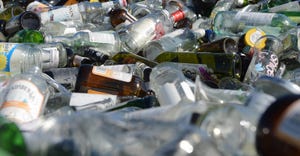What Does the Future Hold for Solid Waste Management and Innovation?
Landfill emissions are an area of prime current interest given many landfill owners are being scrutinized for their impact on greenhouse gas emissions and that they are being woven into the fabric of corporate ESG goals. While this topic involves many facets, the primary point of discussion revolved around how to model and directly measure landfill emissions.
March 10, 2022

In the waste management industry, innovation and credible science are needed to drive change and effectively navigate the issues facing solid waste. The Global Waste Management Symposium (GWMS) serves as the #1 forum to exchange ideas and share the current state of operations and emerging science. As a result, GWMS provides significant insight into the future direction of what issues need to be addressed and what innovation may be needed.
The 2022 GWMS, held in Indian Wells, CA, February 14-17, highlighted major trends in the solid waste industry and delivered a record number of scholars and industry leaders, eager to share their studies with industry peers. These trends help guide the research needed to advance innovation.
The jam-packed event identified a number of key trends in the industry, which help guide the research needed to advance innovation, including:
Landfill Gas Emissions/Odor
PFAS
Leachate
Waste Stability
Environmental Justice
Landfill emissions are an area of prime current interest given many landfill owners are being scrutinized for their impact on greenhouse gas emissions and that they are being woven into the fabric of corporate ESG goals. While this topic involves many facets, the primary point of discussion revolved around how to model and directly measure landfill emissions. Emissions are also closely linked to odor, which is another key issue the waste industry continuously navigates. How odor is measured, what strategies can be used to mitigate odor, and how to engage surrounding communities proactively were discussed.
One of the biggest costs in managing a landfill is dealing with leachate, primarily in terms of treatment, or pre-treatment prior to disposal at a POTW of traditional contaminants such as nitrogen/ammonia removal, BOD and particulates. However, emerging contaminants are a significant focus. PFAS as an emerging contaminant is particularly important, since it provides treatment challenges, but is also a potential opportunity for the waste management field, provided end points can be posited as a safe long-term repository for PFAS, and landfills have been recommended by the EPA as a means of disposal. Beyond treatment in leachate, understanding the mass flow of PFAS and transformations that may occur are important, as well as what happens to PFAS in landfill gas.
Waste disposal into landfills increasingly contains higher volumes of liquids or high moisture content wastes, resulting in unique challenges of how to manage and place these wastes. If not vigilant or handled carefully, landfills may experience slope stability issues or waste slides. This shift has resulted in the need to develop updated and novel strategies for managing special wastes.
Environmental justice is an emerging topic in the solid waste field and the topic was debuted during the 2022 GWMS to a crowded room. Discussions on this topic included what environmental justice means, how it is being interpreted from a policy standpoint, and what impacts does it have in regarding to siting new facilities, expansions and permit renewals.
Other waste industry trends involve organics management, anaerobic digestion, waste collection and characterization, liners/covers, coal ash and using life cycle assessment to evaluate environmental burdens.
Progress, innovation and forward momentum encapsulated GWMS, but the importance of additional science and data around these topics was also highlighted among the academics and industry pros at the conference.
“At no time in the last 30 years has the industry been faced with so many challenges. How these challenges are solved with good science and technical innovation will define the future of waste management,” said James Little, Senior Vice President, Engineering and Disposal Waste Connections Inc.
“The future of the waste management industry will be built upon credible science and unbiased research. This year’s Global Waste Management Symposium (GWMS) was the culmination of years of dedicated research by scholars and industry professionals, and EREF is proud to be a strategic partner of this endeavor,” said Bryan Staley, President and CEO of EREF. “EREF leads innovation in solid waste research, and we are grateful for the opportunity to gather engineers, scientists and industry leaders at GWMS to discuss the evolving challenges our industry faces and look ahead to the future.”
“Data helps us understand our own industry, and it can also help other industries understand us. In a world that is increasingly acknowledging that our environmental challenges are connected, data from well-founded science is the most powerful vehicle to build bridges and solve problems. We're already seeing this with PFAS, and circular economy only increases the value of data from the waste industry,” said Kristin Kinder, Vice President of Research & Waste Stream Sustainability, Wastequip.
“Sound science is critical to making decisions when innovating in the waste management industry. EREF is integral to executing GWMS, however its larger value is in helping produce the science and data that move sustainable materials management forward,” said Joseph Benco, Director, Engineering at Republic Services Inc.
The Environmental Research & Education Foundation (EREF) is a strategic partner for GWMS and plays a key role in advancing innovation in the solid waste management industry. EREF’s mission is central to innovation and credible science, and a significant portion of the presentations given at GWMS were by EREF scholars, grantees or were influenced by prior research supported by EREF. The Foundation’s efforts are advancing science in the waste management industry through grants they have funded on the central topics discussed at GWMS. To learn more about EREF’s current research programs, click here.
About the Author
You May Also Like
.png?width=300&auto=webp&quality=80&disable=upscale)

